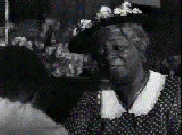|
Lorraine Hansberry's A Raisin in the Sun |
|
|
TABLE OF CONTENTS |
Character analysis: Lena Younger - "Mama" "Does it stink like rotten meat?" When Mama got married and moved into the apartment on the Southside of Chicago, she and Big Walter were expecting to move into a house after one year. She still remembers the furnishings of the apartment being "selected with care and love and even hope" [15]. As time passed, Mama's dream of a house dwindled away into an unlikely hope. A symbol of the dream's small but continued existence was Mama's plant. It represents the whithering of the dream as a result of the denial of a life outside the apartment. The promise of $10,000 is represented as the sunlight for both things keep alive a sense of possibility. The irony for Mama was that the chance for her dream came through the death of her husband. She is conflicted about what to do with the money and insulted at the assignment of any dollar amount to the life of her husband. Like Asagai points out and Mama would agree, it is an unsettling reality to live "in a house - in a world - where all dreams, good or bad, must depend on the death of a man" [16]. She sees the money as a desantification of Big Walter's life. Also, she is offended by the change in the African American mindset where "freedom used to be life - now it's money" [17]. Mama is the product of a different generation than the rest of the family and therefore accustomed to different kinds of injustices and racism. Mama sees the house as something she can pass onto later
generations. Since she's been denied many things in life, she recognizes
the larger meaning of everything for it "'seem like God didn't
see fit to give the black man nothing but dreams - but He did give us
children to make them dreams seem worth while'" [18].
She buys the house as a step toward the creation and fruition of more
dreams for herself, her children, and her grandchildren. She believed
the realization of her dream could eventually open the door for other
family member's dreams. When she realizes she was doing to Walter what
the rest of the world was doing, not giving him a chance to be a man,
she corrected her actions by giving Walter part of the money to open
a personal bank account. Ironically,
|
 The
Art of Social Criticism:
The
Art of Social Criticism:  the
film shows Mama giving Walter the money and saying he should have the
responsibility of head of the family in a bar [
the
film shows Mama giving Walter the money and saying he should have the
responsibility of head of the family in a bar [